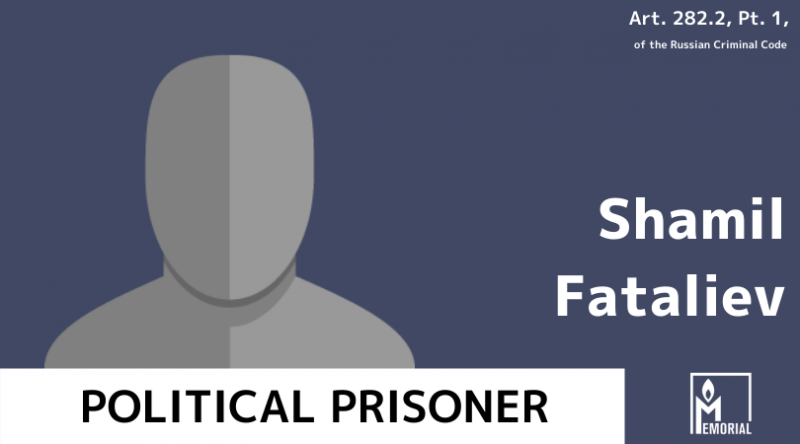A Muslim from St. Petersburg, convicted of involvement in the banned Takfir wal-Hijra, is a political prisoner

Memorial Human Rights Centre, in accordance with international guidelines on the definition of the term ‘political prisoner,’ considers Shamil Fataliev, a Muslim from St. Petersburg, a political prisoner. Fataliev was prosecuted for the non-violent exercise of freedom of conscience. He was imprisoned in order to maintain and strengthen the power of the authorities in violation of the right to fair trial and other rights and freedoms guaranteed by the International Covenant on Civil and Political Rights and the European Convention for the Protection of Human Rights and Fundamental Freedoms. According to our information, there is no evidence Shamil Fataliev committed a crime. We believe the criminal charges against Fataliev should be dropped and he should be immediately released.
Who is Shamil Fataliev and why is he being prosecuted?
In the spring and summer of 2017, 11 Muslims were detained in St. Petersburg, Dagestan and Kabardino-Balkaria. All of them were charged with involvement in the Islamic organisation Takfir wal-Hijra, which was designated an extremist organisation by the Supreme Court of Russia in 2010. One of those detained, a fitter from St. Petersburg named Shamil Fataliev, was charged with organising a cell (Article 282.2, Part 1, of the Criminal Code), while the others were accused of participation in the cell’s activities (Article 282.2, Part 2, of the Criminal Code).
On 23 April 2019 Leninsky district court in St. Petersburg sentenced Fataliev to seven years in a general regime colony while the other defendants received sentences ranging from two and a half years to three years. Five of the defendants were released in the courtroom as they had already served time on remand. As of today, only Fataliev remains behind bars.
Why does Memorial consider Fataliev a political prisoner and the whole case politically motivated?
All the defendants and witnesses in the case denied the existence of any cell of the supposed organisation during the investigation and the trial. Joint prayer sessions and philosophical and religious conversations held outside mosques are characteristic of many currents in Islam that to some extent or other diverge from the mainstream. Many claimed altogether that they first heard of Takfir wal-Hijra from an investigator.
Takfir wal Hijra existed in Egypt in the 1970s. However, since the organisation was broken up by the Egyptian authorities and its leader, Mustafa Shukri, executed in 1978, experts on radical Islam (see, for example, here) have found no reliable evidence of its continued existence.
At the same time, the ideas of ‘takfir’ (accusations of apostasy) on which, in particular, its ideology was based, are fairly widespread in other Islamic movements. Defendants in the St. Petersburg case also invoked the notion of ‘takfir’ and it formed the basis of the charges against them. Moreover, it is not a criminal offence in Russia to issue a ’takfir’ against other Muslims, especially if it is not connected with calls to violence. The experts found no calls to violence or approval of violence in the defendants’ conversations.
It would seem that Takfir wal-Hijra has become yet another radical Islamic organisation for the real or imaginary involvement in which Muslims are being prosecuted by law enforcement agencies, with no attempt made to find evidence of a real criminal offence committed by the alleged suspects. This practice is becoming increasingly widespread in Russia. More than three hundred people are already behind bars on charges of membership in Hizb ut-Tahrir al-Islami. Followers of the Turkish theologian Bediuzzaman Said Nursi are also being prosecuted for alleged membership in Nurjalar, a non-existent organisation.
It is our opinion that, by these means, law enforcement agencies are simply ‘improving their performance indicators,’ substituting the fabrication of such cases for a genuine effort to combat the terrorist threat.
For more information about this case and the opinion of Memorial Human Rights Centre, visit our website.
Recognition of an individual as a political prisoner or as a victim of politically motivated prosecution does not imply Memorial Human Rights Centre agrees with, or approves of, their views, statements, or actions.
How you can help
You can support all political prisoners by donating to the Fund to Support Political Prisoners of the Union of Solidarity with Political Prisoners via PayPal, using the e-wallet at helppoliticalprisoners@gmail.com.
Die Lage der politischen Gefangenen und andere Menschenrechtsprobleme verschärfen sich von Jahr zu Jahr. Wir beleben den Dialog zwischen der russischen und der deutschen Menschenrechtsgemeinschaft wieder und bauen ihre konstruktive Interaktion, wechselseitige Information und Unterstützung auf.
Wir stellen Informationen für die deutsche Öffentlichkeit über die Situation des Schutzes von Menschenrechten in Russland und Belarus zur Verfügung und die russische und belarussische Seiten werden entsprechend über den Stand der Dinge auf diesem Gebiet in Deutschland informiert; wir schaffen einen Mechanismus zur Unterstützung russischer und belarussischer Menschenrechtsverteidiger, Opfer politischer Repressionen und politischer Gefangenen.
Wir freuen uns auf Ihre Teilnahme am deutsch-russischen Menschenrechtsdialog auf unserer Website und in den Sozialen Netzen. Ebenso laden wir Sie ein, den Newsletter zu Menschenrechtsfragen zu abonnieren, indem Sie auf den folgenden Link klicken.